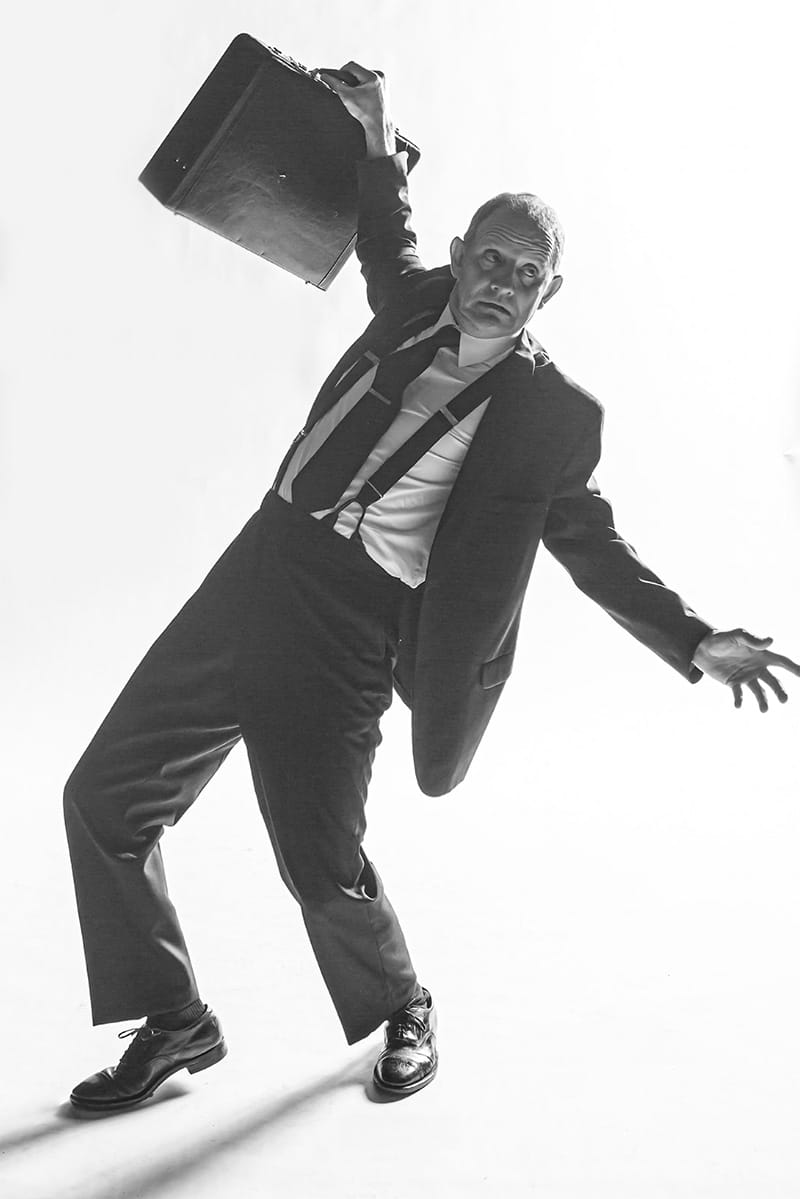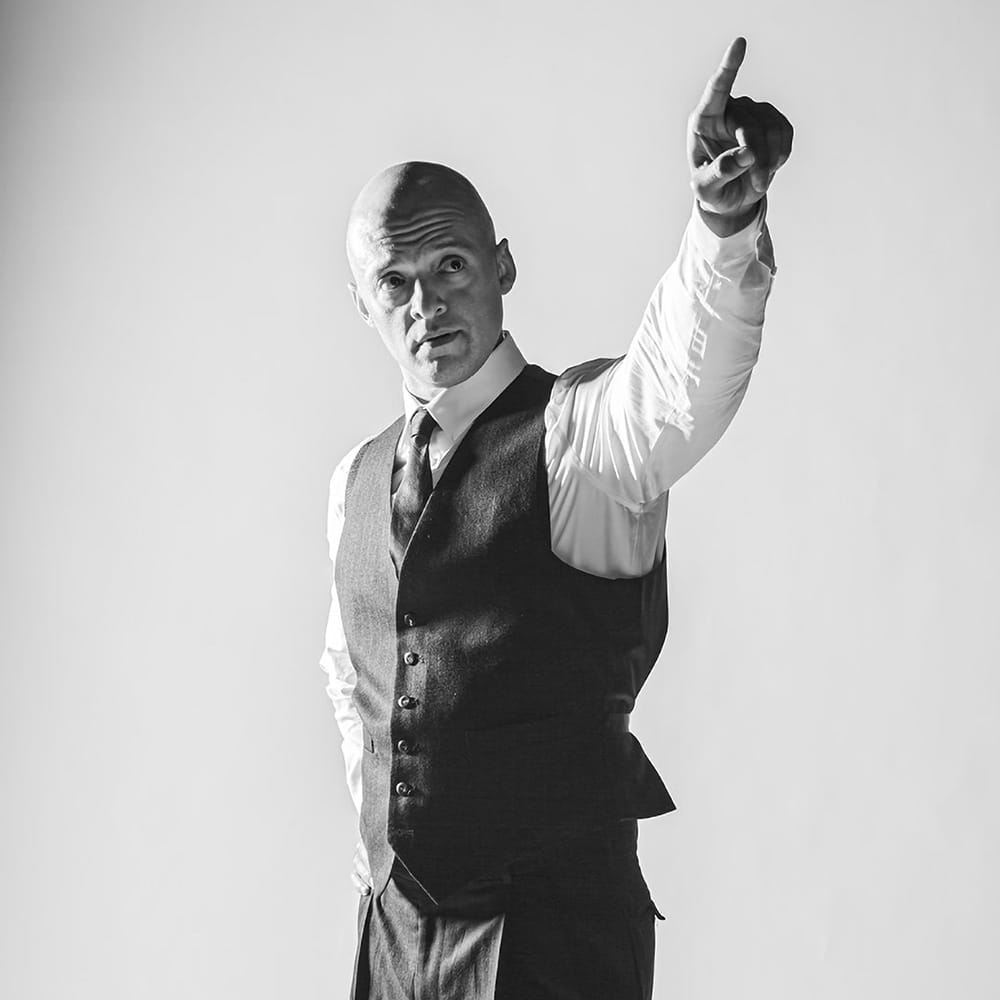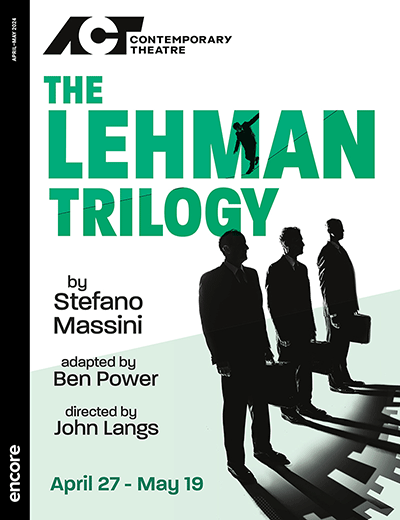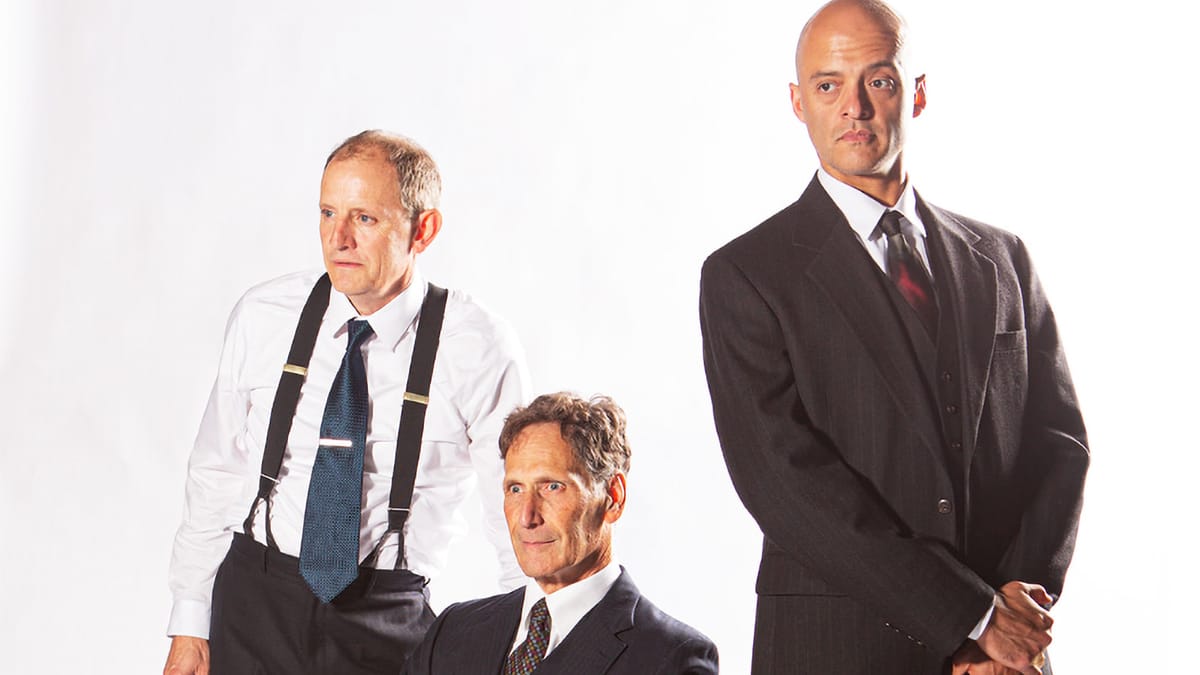April 27 – May 19, 2024
In This Program
- About the Show
- How the Lehmans Changed the World
- Who’s Who
- The Lehman Trilogy Timeline
- Patron Information
- About ACT
- Print Edition
ACT Contemporary Theatre presents
By Stefano Massini
Adapted by Ben Power
Directed by John Langs
April 27 – May 19, 2024
Cast
Bradford Farwell* – Mayer Lehman
Robert Pescovitz* – Henry Lehman
Brandon J. Simmons – Emanuel Lehman
Understudy
Nehemiah Hooks*
Creative Team
John Langs – Director
Julia Hayes Welch – Scenic Designer
An-lin Dauber – Costume Designer
Andrew D. Smith – Lighting Designer
Meghan Roche – Sound Designer
Robertson Witmer – Composer
Mike Tutaj – Projection Designer
Kate Myre – Dialect Coach
Maya Zigler – Dramaturg
Mel Williams – Assistant Lighting Designer
Stage Management
Ruth Eitemiller* – Stage Manager
Elizabeth Stasio – Production Assistant
Melissa Y. Hamasaki* – Swing Stage Manager
Theatre and Season Partners
*Members of Actors’ Equity Association, the Union of Professional Actors and Stage Managers in the United States
“The Lehman Trilogy” is presented by arrangement with Concord Theatricals on behalf of Samuel French, Inc. www.concordtheatricals.com
The Lehman Trilogy was first presented by the National Theatre and Neal Street Productions Ltd, that jointly commissioned the English adaptation of the original play, Lehman Trilogy, at the Lyttleton Theatre on Thursday 12th July 2018 and transferred to the Piccadilly Theatre, West End.
The National Theatre and Neal Street Productions Ltd presented the US premiere of The Lehman Trilogy on 27th March 2019 at the Park Avenue Armoury, New York and first presented the production on Broadway at the Nederlander Theatre on 14th October 2021.

How the Lehmans Changed the World
A Note from the Director and Artistic Director John Langs
I walked into a bank in Santa Monica, California. I was there to secure a loan for new car, and this bank had quoted a great rate and assured me with my credit rating the loan would be no problem. Walking through the large glass doors of the bank on the oppressively sunny morning, I was struck with a palpable sense that something was off. People were moving quickly. Whispering to one another—I remember whispering.
You could almost smell worry in the air. The lender I sat down with (who was so California-laid-back just the day before when he talked me through the paperwork) was now visibly shaken.
“We can’t give you the loan,” he said.
“You told me this was a done deal on the phone,” I replied.
Then, he said something so odd that I can still hear the cadences and timbre of his voice all these years later.
“It’s not you, it’s the whole world. We can’t give anyone anything.”
Minutes later, I learned that our economic systems had fallen off a cliff. I was sitting in a bank asking for a loan on September 15th, the day that the venerable Wall Street bank The Lehman Brothers collapsed. On the day the largest bank to ever declare bankruptcy in US history became a symbol of the devastation caused by the global financial crisis, I was in line, like many Americans, to get a loan. And there was nothing to be given.
It was the strangest feeling. One minute, you are living in a world of promise and possibility, and then somewhere a bubble bursts and there is only fear and scarcity.
This play takes the long view of how our country arrived at that moment. What it gave up along the way.
Employing the epic poem tradition dating back to The Iliad, The Lehman Trilogy is a classic American immigrant story and powerful morality tale.
It is a spectacular rendering of how one immigrant family escaping oppression in the home of their birth came to a country of promise. They brought with them faith, grit, ambition, and ingenuity—as so many people from around the world have also carried with them to plant into the fertile soil of the promise called America.
It is also true that as America forged itself it did so by participating in systems that profited off the forced labor of others. Other choices made through generations shaped a system that created modern capitalism, which favors so few with so much, and which, like it or not, we all participate in or are affected by.
Like many great works, this one asks you to hold conflicting ideas uncomfortably close. To see on one hand how, layer-by-layer, immigrants from around the world built up this nation. Aiming to protect themselves and their families, to grow, and to thrive as they strove to become the citizens of the land of possibility they dreamed about. On the other hand, in doing so, they let go of some of what centered them, losing their moorings, losing touch with their purpose, their concrete grounding in what mattered most.
This play is both an articulation of the leaps of genius and ambition that hardworking people from all corners of the world offered to America and a blistering critique of how our collective ambition can collapse with devastating consequences once it becomes untethered from humanity.
In its folds is the idea that if the soul and human purpose of any of our endeavors gets diluted to a point where we serve only to gain, there is no telling how far we can fall.
This is an immigrant story. It’s a story of assimilation, of self-preservation. And therefore, a uniquely American story. It is also a story of building an American dream that crumbles into a chaotic nightmare for future generations.
The bandage that stemmed the bleeding in 2008 came in the form of a 700 billion dollar bailout. It served to protect the system and the 1%. It left 99% in fear and mistrust. Something broke that day.
We need to remember that what we build and how we layer our great achievements can create environments that can trigger unforeseen and devastating consequences for the future. It is stories like this that give us the long view of the past, teaching us how we arrived at the present. It is stories like this that will help us forge a more responsible lens for the future. What starts as a pure impulse unchecked by generational integrity can become something monstrous. Our stories hold the collective wisdom that we can pass from generation to generation to remember and this story has so much to offer.
John Langs
Who’s Who
Cast

Bradford Farwell*
Mayer Lehman
Previously at ACT: A Christmas Carol, Daisy, Worse than Tigers, Seven Ways to Get There, Mary Stuart, Jekyll and Hyde. Broadway: Much Ado About Nothing, The Miser. Seattle: Seattle Repertory (Indecent, Charles III, Photograph 51, You Can’t Take it With You, The Imaginary Invalid, Twelth Night, Noises Off, The Great Gatsby); Intiman (John Baxter, All My Sons, Grapes of Wrath, Richard III, A Thousand Clowns); Strawshop (Breaking the Code); 5th Avenue (Guys and Dolls); and Seattle Shakespeare (The Rivals, Measure for Measure, Cymbeline, Julius Ceasar). Regional: Nebraska Shakespeare (Hamlet, Othello, Cymbeline); American Player’s Theatre (She Stoops, Henry V, The Misanthrope); and New Century Theatre Company (Festen, My Name is Asher Lev). Bradford was a company member at The Stratford Festival in Canada for three years. TV: Grimm and Leverage. Training: Webber Douglas Academy of Dramatic Arts, London. Thanks Willa and Poppy for being the best kids and Hazel for being my Clarence.

Robert Pescovitz*
Henry Lehman
Robert Pescovitz has guest starred on many television programs, most recently the Law and Order reboot. Other television credits include Grimm, Mike and Molly, Cold Case, Without A Trace, Close to Home, and Raines. He also appeared in the feature Blood in Blood Out. He has worked in regional theaters across the United States. Most recently appearing in Indecent at the Chautauqua Institution. He was also in the acting company of the Old Globe Shakespeare Festival. In addition, he appeared in a national tour of The Great Tennessee Monkey Trial for L.A. Theatre Works which was subsequently broadcast on National Public Radio. He has a BS from Northwestern University and an MFA from The American Conservatory Theatre. He was a founding member of A Noise Within Theater Company and a member of Furious Theater company in Los Angeles. Robert is a recipient of a Los Angeles Drama Critics Circle Award for Lead Performance.

Brandon J. Simmons
Emanuel Lehman
Brandon J. Simmons is an actor, writer, director, and producer. At ACT he produced and appeared in three productions with The Seagull Project, a company he co-founded and led in various capacities from 2011 until 2018. He directed The Thin Place at ACT in 2021. Brandon has appeared with many Seattle theaters over the years. Favorite roles include a solo Beowulf and Lord Henry Wotton in The Picture of Dorian Gray (Book-It); Kulygin in The Three Sisters (ACT); Konstantin in The Seagull at the Ilkhom Theatre in Tashkent, Uzbekistan, (The Seagull Project); Arthur in Feathers and Teeth (Washington Ensemble Theatre); Antonio Salieri in Amadeus, (Seattle Public Theatre); and Olivia in Twelfth Night(Seattle Shakespeare Co./Wooden O). His original scripts have been produced twice at Annex Theatre, the second, Is She Dead Yet?, receiving the Gregory Award for Outstanding New Play in 2017.

Nehemiah Hooks* (he/they)
Understudy
Nehemiah is happy to be back with ACT after being a part of The Case for the Existence of God and Choir Boy. Other credits include: Beautiful: The Carole King Musical, Hello Dolly!, Miss Step (Village Theatre), Disney’s The Little Mermaid, The WIZ, And So That Happened…, Disney’s Beauty and The Beast (5th Ave Theatre), Shout, Sister, Shout! (Seattle Repertory Theatre), and many shows on Norwegian Cruise Lines. Love and gratitude to family and friends for their continual support.
Creative Team
Peter Chapman
Author
Peter Chapman is author of The Last of the Imperious Rich: Lehman Brothers, 1844–2008, a leading reference on the history of the Lehman family.
An-lin Dauber (she/her)
Costume Design
An-lin Dauber is a set and costume designer based in Seattle. Seattle credits include Metamorphoses, Little Women (Seattle Rep) and The Tempest (Seattle Rep’s Public Works). She is a company member of The Feast, where she has designed The Sign in Sidney Brustein’s Window (Intiman & The Feast); Champagne + Sodomy: The Life and Crimes of Oscar Wilde; Amen Corner; Marisol; Blood Wedding; The Bar Plays: Small Craft Warnings; The Time of Your Life; A Bright Room Called Day. Off-Broadway/New York: Paul Swan is Dead and Gone; What You Are Now(The Civilians), Letters That You Will Not Get (American Opera Project), H*tler’s Tasters; Great Novel (New Light Theater); Salesman…; June is the First Fall (Yangtze Repertory Company), and Bulrusher; Passage (Juilliard). Assistant Professor of Costume Design at the University of Washington. MFA Yale School of Drama. Proud member of USA 829. anlindauber.com.
Ruth Eitemiller* (she/her)
Stage Manager
Recent credits include Sanctuary City (Seattle Rep), Ken Ludwig’s Sherwood: The Adventures of Robin Hood (Village Theatre), A History of Theatre: About, By, For and Near (ACT), Mr. Dickens and His Carol (Seattle Rep), and Sweat (ACT). Around town Ruth has also worked with The 5th Avenue Theatre, Seattle Shakespeare Company, New Century Theatre Company, and others. She was the recipient of the 2018 Melissa Hines Backstage Award, and she currently leads the local group SM Collective: smcollectiveseattle.org
Melissa Y. Hamasaki (she/her)
Swing Stage Manager
Melissa Y. Hamasaki is pleased to join the cast and creative team for this production. Favorite credits include Ramayana, The Women (ACT), All My Sons (Intiman), Uncle Vanya (The Seagull Project), and Memphis (The 5th Avenue Theatre). Locally, she has also worked with the Seattle Rep, Seattle Children’s Theatre, the Seattle Opera, the Pacific Northwest Ballet, and the UW School of Drama. Training: Allen Lee Hughes Stage Management Fellow at Arena Stage, Washington, DC; Technical Apprentice, Santa Fe Opera, NM.
John Langs
Director
John Langs has served as ACT Contemporary Theatre’s Artistic Director since 2016. He joined ACT in 2013 as Associate Artistic Director. Langs’s 16–year freelance career afforded him the opportunity to work with many prestigious theatre companies across the country. He has directed productions at Playwrights Horizons NY, Ensemble Studio Theater NY, Milwaukee Repertory Theatre, Lookingglass Theater Company in Chicago, Circle X in Los Angeles, The Resident Ensemble, New Century Theatre Company, Washington Ensemble Theatre, and Seattle Shakespeare Company. Langs received his directing degree from the University of North Carolina School of the Arts. Some of his favorite directing credits include The Shaggs Philosophy of the World (Los Angeles Drama Critic Circle Award for Best Original Musical), Brothers Karamazov (seven LADCC Awards including Best Production of the year and Best Direction), and directing Kurt Beattie in King Lear. Langs received the first annual Seattle Gregory Award honoring excellence in direction for The Adding Machine. As a dedicated fan of original work, Langs has shepherded over a dozen projects to their premiere production.
Stefano Massini
Playwright
Stefano Massini is an internationally renowned novelist and playwright, the first Italian author to receive a Tony Award. He regularly contributes to the Italian newspaper La Repubblica, and for several years he has served as artistic consultant at Piccolo Teatro di Milano – Teatro d’Europa. His works, including The Lehman Trilogy, have been translated into 30 languages, and his plays have been performed in more theatres around the world than those of any other living Italian writer, produced as far afield as Iran and Korea, and staged by directors such as Luca Ronconi and Sam Mendes.
His most acclaimed works, beyond The Lehman Trilogy, include: Intractable Woman, a decades-long international success; Ladies Football Club, which premiered to wide acclaim in Spain; and 7 Minutes, hailed by Le Monde as a “masterpiece” at the Comédie Française. He has won numerous Italian awards, including the Premio Vittorio Tondelli and the Premio Ubu, as well as the Tony Award, the Drama Guild Award and the Outer Critics Circle Award. Qualcosa sui Lehman (The Lehman Trilogy) was among the most acclaimed novels published in Italy in recent years and won the Selezione Campiello Prize, the Super Mondello Prize, the De Sica Prize, the Prix Médicis Essai, and the Prix Meilleur Livre Étranger.
In 2022 he completed his ten-year writing work on the birth of the atomic bomb in a play entitled Manhattan Project, already requested in many theatres around the world. His rewrite, based on Adolf Hitler’s Mein Kampf, will debut in 2024.
Kate Myre
Dialect Coach
Kate Myre is a professor at Cornish College of the Arts and has worked nationally as a voiceover artist and dialect coach. She has worked extensively with Pulitzer and Tony award winning playwright and director, Brian Yorkey, dialect and text coaching the Netflix series 13 Reasons Why as well as Echoes (2022) and The OuterBanks. In Oslo, Norway she coached the acclaimed production of The Hamlet Complex at the Royal Opera House, directed by Alan Oyen. She has coached for The Seattle Rep, The Seattle Children’s Theatre, ACT, The Village Theater, Seattle Public Theater, The Immediate Theatre, Theater Schmeater, Jack Straw Foundation, and The Boston Repertory Theatre. Kate coaches actors from all over the world, and is currently working with several Bollywood performers on perfecting their American dialects. She is pleased and grateful to be working with ACT again and would like to thank Sherif Amin, Matthew Erlich, and Zoe Sheilds for their assistance.
Meghan Roche
Sound Designer
Meghan Roche is a Seattle-based sound designer and engineer. Her theatre design work has been heard on stages at a variety of theatres across Seattle (ACTLab, Taproot Theatre Company, Book-It Repertory Theatre, Seattle Public Theater, Intiman, Theatre Schmeater, Seattle Shakespeare/Wooden O, West of Lenin, and others) and in Southern California (South Coast Repertory, New Swan Shakespeare Festival, UC Irvine).
She sits on the board of the Theatre Sound Designers and Composers Association (TSDCA) and is a member of USITT. Education: BA in Theatre with Honors - Seattle University, MFA in Sound Design - University of California, Irvine.
Andrew D. Smith
Lighting Designer
Andrew is a Seattle-based lighting designer, and has worked with ACT since 2014, most recently lighting A Christmas Carol, Choir Boy, and Dracula at ACT. National work includes: Arizona Theatre Company (Native Gardens), Indiana Repertory Theatre (The Diary of Anne Frank), Pittsburgh Public Theatre, Cornerstone Theatre Company, Flint Youth Theatre, Horizon Theater Company, and Cincinnati Shakespeare Company. Seattle work has been seen at Seattle Repertory Theatre, Seattle Children’s Theatre, Book-It Repertory Theatre, Seattle Shakespeare Company, New Century Theatre Company, Washington Ensemble, Azeotrope, Strawberry Theatre Workshop, Seattle Public Theatre, Theater Off Jackson, ArtsWest, On the Boards, Velocity Dance Center, and Broadway Performance Hall. Andrew holds a BA from Duke University and an MFA from the University of Washington, where he currently teaches.
Elizabeth Stasio (she/her)
Production Assistant
Liz is a Seattle-local stage manager and theatre artist thrilled to be working at ACT for the very first time on this production. Stage management and backstage credits include work with Seattle Children’s Theatre, Seattle Rep (including the Public Works program), Seattle Shakespeare Company, The 5th Avenue Theatre, 14/48 Projects, and others.
Julia Hayes Welch (she/her)
Scenic Designer
Julia Welch is always excited to design with ACT! Selected credits: Pass Over, Skylight, Alex and Aris, Bad Apples (ACT); (The 5th Avenue Theatre); The Wonderful Wizard of Oz (Seattle Children’s Theatre); The 25th Annual Putnam County Spelling Bee (Village Theatre); HIR, Barbecue, Bootycandy (Intiman); Fire Season, Ironbound, Grounded (Seattle Public Theatre); My Antonia, Howl’s Moving Castle (Book-It Repertory Theatre); The Tempest, As You Like It, She Stoops to Conquer, Arms and the Man, Government Inspector (Seattle Shakespeare Company); Uncle Vanya (Seagull Project) and The Revolutionists, An Octoroon, Peter and the Starcatcher (ArtsWest). MFA: University of Washington. Much love to W, M & AJ. jhwelchdesigns.com
Robertson Witmer
Composer
Rob is a Seattle based composer and sound designer. Previously at ACT: Dracula, Daisy, Romeo + Juliet. Other recent productions include: Murder on the Links (Laguna Playhouse, Austin Playhouse); X: The Life and Times of Malcolm X (Seattle Opera); Grief (Spectrum Dance Theater); The Moors (Seattle Public Theater); A Christmas Carol (Merrimack Repertory Theater), and Romeo & Juliet (Seattle Shakespeare Company). His work has also been heard at Alvin Ailey American Dance Theater, Seattle Children’s Theatre, Seattle Rep, and Teatro ZinZanni. Rob also plays with several bands, including the Toucans, the Love Markets, and “Awesome”.

The Lehman Trilogy Timeline
This content researched and written by co-dramaturg Carol Ann Tan with contributions by co-dramaturg DeRon S. Williams, for TimeLine Theatre Company’s Chicago premiere production of The Lehman Trilogy, 2023. Courtesy of TimeLine Theatre Company.
The Lehman Trilogy is a sweeping epic that mythologizes the people and the institution of Lehman Brothers. To do this, the play takes some liberties with the historical timeline, including by embellishing the Lehmans’ personal involvement in some of the era’s landmark innovations. The timeline below highlights a few key examples of the play’s poetic license. NOTE: Entries that are indented cite some of the changes in the historical record represented in the play.
Crucially, these changes transform the Lehmans into avatars for the system they lived within, allowing The Lehman Trilogy to humanize the machinery driving modern American capitalism itself—and prompting us, as viewers, to imagine the very human cost of pursuing the American Dream.
September 11, 1844 Heyum Lehmann (later Henry Lehman) emigrates from Rimpar, Bavaria, to America. Arriving via New York, he makes his way to Montgomery, Alabama, where he opens a store specializing in dry goods—especially cotton.
1847 Mendel Lehmann (later Emanuel Lehman) emigrates from Rimpar to America and joins his brother, Henry, in Montgomery.
July 17, 1850 Maier Lehmann (later Mayer Lehman) emigrates from Rimpar to America and joins his brothers, Henry and Emanuel, in Montgomery.
November 17, 1855 Henry dies of yellow fever.
1858 Lehman Brothers transitions from general merchandise to cotton commodities. Under Emanuel, the company establishes its first branch office in New York, at 119 Liberty Street.
1858 Mayer Lehman marries Babette Newgass.
1859 Emanuel Lehman marries Pauline Sondheim.
The play cites Emanuel’s marriage as happening one year later, in 1860.
1861–1865 The Civil War takes place, which greatly impacts the cotton trade. Mayer, who is based in the South, is cut off from Northern manufacturers; Emanuel, who is based in the North, is cut off from the Southern cotton supply. To survive, the company does business with both sides of the war.
November 9, 1861 Philip Lehman, son of Emanuel and Pauline, is born.
1862 Facing financial difficulties because of the war, Mayer decides to merge his cotton
brokerage with that of John Wesley Durr. Together, they form Lehman, Durr and Company.
1864 Alabama Governor Thomas H. Watts appoints Mayer Lehman as his agent to send funds to aid its soldiers in federal prisons. The mission does not succeed.
1867 After the Civil War, Lehman Brothers assists with Alabama’s Reconstruction. The firm
is designated to be Alabama’s fiscal agent, and helps take care of some of the state’s financial
obligations.
The play credits Mayer as positioning Lehman Brothers to essentially run Alabama’s state bank in 1867. This level of involvement is not exactly accurate.
1868 Mayer joins Emanuel in New York City, taking new offices in Pearl Street—just off Hanover Square, the center of the cotton trade.
1870 The New York Cotton Exchange is founded by 100 cotton brokers and merchants,
including the Lehman brothers.
1873–1878 The Panic of 1873 takes place. A financial crisis that causes a depression in the United States and temporarily closes the New York Stock Exchange, the Panic is caused, in part, by the failure of the bank Jay Cooke & Company after it invests heavily in railroads.
March 28, 1878 Herbert Lehman, son of Mayer and Babette, is born.
1881 The New York Stock Exchange (NYSE) opens in a new building on Wall Street; Solomon
Paprinskij begins his tightrope walk in front of the building. In reality, the NYSE moved into its Broad Street location in 1865. Solomon Paprinskij is entirely fictional; his closest historical
counterpart is Philippe Petit, who did a tightrope walk between the Twin Towers in 1974.
1883 Lehman Brothers joins the New York Coffee Exchange.
The play places this event much earlier, in 1867. However, the historical Coffee Exchange was founded in 1882.
1884 Philip Lehman marries Carrie Lauer.
The play cites this marriage as happening three years later, in 1887.
Instead, in the play, 1884 is when the Lehmans decide to invest in the Baltimore company United Railways. But the historical United Railways (which was also Baltimore-based) only began operations in 1899.
1887 Philip Lehman becomes a partner at Lehman Brothers. He is the first chairman of the
company’s board.
1887 Lehman Brothers becomes a member of the New York Stock Exchange.
September 29, 1891 Robert “Bobby” Lehman, son of Philip and Carrie, is born.
In 1891, the play also shows Lehman Brothers—under Philip Lehman’s leadership—spearheading an investment in building the Panama Canal. In reality, building the Panama Canal was a U.S. government initiative, and it’s unclear whether the Lehmans helped fund it at all.
June 21, 1897 Mayer Lehman passes away.
1899 Lehman Brothers begins to pivot to investment banking, beginning with its public offering for the International Steam Pump Company.
1901–1925 Philip Lehman serves as the head of Lehman Brothers. Notably, he is one of the first financiers to realize that issuing new stocks could potentially generate high profits.
The play shows Herbert Lehman parting ways with the company to become the Governor of New York as early as 1901. However, at this point, the historical Herbert is still very much involved with the company, and will only take political office beginning in 1928.
1906 Philip Lehman begins shifting Lehman Brothers from being a commodities house (where the firm buys and sells physical goods on behalf of other businesses) to being a house of issue (where the firm helps other companies make investments, such as stocks and bonds, available for public sale).
January 10, 1907 Emanuel Lehman passes away.
While a precise date is not given, the play implies that Emanuel passes away in the 1910s.
1908 Herbert Lehman becomes a partner at Lehman Brothers.
April 28, 1910 Herbert Lehman marries Edith Louise Altschul.
1911 Philip Lehman begins a private collection of fine art, storing it at his 7 West 54th Street
house. This collection will later be continued by his son Robert “Bobby” Lehman.
1913 Bobby Lehman graduates from Yale University.
The play shows Bobby Lehman joining the board of Lehman Brothers in the 1910s. However, Bobby will only move into a leadership position in the following decade.
1917–1919 Herbert Lehman serves in the United States Army during World War I, for which he is awarded the Army Distinguished Service Medal.
1918 Georgios Petropoulos (later George Peterson) immigrates to the U.S. from southern Greece.
1923 George Peterson opens a Greek diner named Central Café in Kearney, Nebraska.
1924 John M. Hancock is the first non-family member to become a partner at Lehman Brothers.
1925–1969 Robert “Bobby” Lehman takes over the leadership of Lehman Brothers.
The play shows Philip Lehman still leading Lehman Brothers in 1929.
December 22, 1925 Lewis “Lew” Glucksman is born into a second-generation Hungarian Jewish family living in New York City.
June 5, 1926 Peter G. “Pete” Peterson, son of George Peterson, is born in Kearney, Nebraska.
1927 Monroe C. Gutman and Paul Mazur become the next non-family members to become partners at Lehman Brothers.
1928 Herbert Lehman becomes chairman of the finance committee of the Democratic Party. In the same year, he is elected Lieutenant Governor of New York, and he resigns from Lehman Brothers upon taking office.
1929 Lehman Brothers forms its own close-ended investment company, called Lehman Corporation.
The play depicts the Lehman Corporation as a company rebranding. It also takes place 10 years
earlier, in 1919.
May 1929 Bobby Lehman marries his first wife, Ruth S. Lamar. Before Bobby, Ruth had been married to John Williams “Jack” Rumsey.
The play shows Bobby’s courtship with Ruth taking place at the same time as the Wall Street
Crash of 1929, but the Crash actually happens later in the year.
June 1929 Lehman Brothers moves into its new headquarters at 1 William Street, where it will stay until 1980.
October 24, 1929 The Wall Street Crash of 1929 begins. On this day, known as “Black Thursday,” the stock market crashes catastrophically.
The play shows two additional and fictional events occurring on Black Thursday: First, numerous bankers die by suicide (while suicides increased in the years following 1929, there was no rash of suicides during the Wall Street Crash itself); and second, Solomon Paprinskij falls from his tightrope for the first time in 50 years.
November 8, 1929 J.J. Riordan, president of the County Trust Company, dies by suicide, shooting himself. He reportedly sustained heavy financial losses during the market crash.
1931 Bobby Lehman and Ruth S. Lamar divorce.
1933–1942 Herbert Lehman is elected the 45th Governor of New York.
1933–1939 In the wake of the Wall Street Crash of 1929, the U.S. government begins
implementing regulations against banks.
1934–1951 Bobby Lehman marries for a second time, to Ruth “Kitty” Meeker.
March 21, 1947 Philip Lehman dies.
1949–1957 Herbert Lehman is elected to represent New York in the U.S. Senate.
The play shows Herbert Lehman becoming Senator as early as 1939.
July 10, 1952 Bobby Lehman marries for a third time, to Lee “Elena” Anz.
1957 Nearly 300 works of art from Bobby Lehman’s private collection receive a solo exhibit at the Louvre Museum in Paris. At the time, he is the only private American collector to have received this honor.
1963 Lewis Glucksman joins the staff of Lehman Brothers.
December 5, 1963 Herbert Lehman passes away.
1966 Lew Glucksman becomes a partner at Lehman Brothers.
1969 Richard S. “Dick” Fuld joins the staff at Lehman Brothers.
In the play, Lew Glucksman takes on Dick Fuld as his protégé in 1969. It is historically true that the two shared this relationship, but it’s not clear if it began from the first year that Fuld began working at Lehman Brothers.
August 9, 1969 Robert “Bobby” Lehman, the last of the Lehmans to head the company,
passes away.
1973–1983 Pete Peterson becomes CEO and Chairman of Lehman Brothers.
1975 The Metropolitan Museum of Art opens the Robert Lehman Wing to the public. After
Bobby’s death, the museum had received almost 3,000 works of art from Bobby’s collection as a donation. According to the museum, it is “one of the most extraordinary private art collections ever assembled in the United States.”
1977 Lehman Brothers adds new office spaces at 55 Water Street. This space is used to
centralize all of the company’s equity and fixed income sales and trading operations.
The play has this expansion take place earlier, alongside Lew Glucksman’s arrival at the firm in
1963.
1977 Lehman Brothers merges with Kuhn Loeb & Co.
1983 Lew Glucksman becomes co-CEO of Lehman Brothers alongside Pete Peterson.
1983–1984 Just a few months after the co-CEO positions are announced, Lew Glucksman becomes the sole CEO of Lehman Brothers. Pete Peterson is ousted following conflicts in the pair’s working relationship.
1984 Following financial troubles, Lehman Brothers is acquired by Shearson Division of
American Express, and new leadership is put in place.
1994 American Express spins off Lehman Brothers into Lehman Brothers Holdings, Inc.
1994–2008 Richard “Dick” Fuld becomes the last CEO of Lehman Brothers.
2000s Lehman Brothers begins buying mortgage lenders and heavily invests in financial products that rely on mortgages as collateral.
September 15, 2008 Hit hard by the subprime mortgage crisis, Lehman Brothers declares bankruptcy.
Patron Information
During the Show
The videotaping or making of electronic or other audio and/or visual recordings or streams in any medium, including the internet, is strictly prohibited, a violation of the author(s)’s rights and actionable under United States copyright law. For more information, please visit:
https://concordtheatricals.com/resources/protecting-artists
Audience members are cordially reminded to silence all electronic devices.
Please do not walk on the stage before, during, or after the show.
Food and Drink
Bar service and concessions are available in the lobby. Cash and cards accepted. No outside food or drink is allowed.
Group Sales
Groups of 10 or more can save on most productions. For Box Office hours visit acttheatre.org/visit/box-office
Smoking Policy
Smoking is NOT allowed in any part of the building or within 25 feet of the entrance.
Firearms Policy
No firearms of any kind are allowed in any part of the building.
Lost and Found
Please contact the Box Office at boxoffice@acttheatre.org or call 206.292.7676. For Box Office hours visit acttheatre.org/visit/box-office
COVID Safety Policy
ACT’s COVID-19 safety policies will continue to be reviewed and updated based on the advice of local health authorities, federal government guidance, and evolving circumstances.
Accessibility
ACT offers the Figaro MobiTxt® Closed Captioning System for audience members who are Deaf or hard of hearing. This system is offered at all performances in most of our theatres. ACT is also equipped with the Williams Sound® Audio Equipment, which amplifies stage sounds with the aid of headsets and also provides sound for our Audio Description performances. All devices can be reserved at the time of ticket purchase and/or requested upon arrival to the theatre (ask staff for assistance). Both devices can be reserved at the time of ticket purchase or picked up at our Accessibility table.
Large Print Programs are available and can be picked up at the Accessibility table.
Audio Description and American Sign Language (ASL) interpretation is offered at the following performances:
- The Lehman Trilogy, Saturday, May 11 at 2pm
ACT Contemporary Theatre Contact Information
700 Union Street, Seattle, WA 98101
Phone: 206.292.7676
acttheatre.org
Volunteers
Thank you for being an ACT volunteer. We appreciate you.
If you would like to volunteer at ACT, please email volunteer@acttheatre.org
About ACT
- ACT Leadership
- Land Acknowledgment
- ACT Core Company
- Commitment to Equity, Diversity, Inclusion, Accessibility, and Belonging
- ACT Staff
Print Edition



